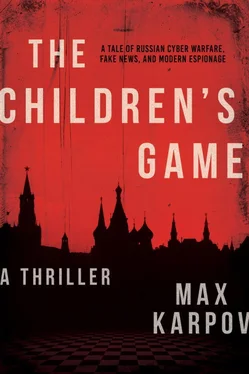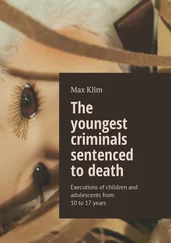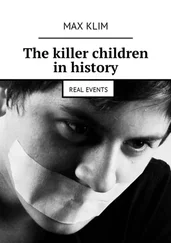“Did you say cyber attacks, too? Against us?”
“No, cyber hacks, ” David said. “Against us, NATO, European governments. You know what Russia’s motto is, right, Mom? Do unto others as you think they’re going to do unto you.”
Anna laughed. That sounded right. She was reminded of Putin’s famous remark about ISIS in Syria: “As I learned on the streets of Leningrad, if a fight is inevitable, then you strike first.”
“So what do you think?” she said. “What are you hearing?”
“Something in the Baltics?” He exhaled dramatically. “I mean. Russia could move on Latvia or Belarus in three or four days and we couldn’t do much to stop them, right?”
“Maybe,” Anna said. “But not without creating international outrage.”
He seemed to hesitate before agreeing with her. “Unless they were able to convince people that they had a legitimate reason for it.”
“Is that what you’re hearing?”
“Not really,” he said. “I’m just saying it’s possible.”
“Okay.” Anna thought about that, and the scenario in the Baltics that had been talked about for years: Russia creates a pretext for striking a NATO neighbor. NATO is then forced under Article 5 to respond. If it doesn’t, Russia has, among other things, rendered NATO obsolete.
David glanced at his mother expectantly now, as if she were going to tell him more. But she wasn’t; she was thinking. They settled into a long silence, coming at last to the rolling, leafy suburban neighborhood where Anna lived. Her house was a split-level, built in the early sixties; it had come with an acre of property and a creek, which created the illusion of being in the country even though she lived just ten minutes from the Capital Beltway.
Anna’s nearly identical dachshunds, Zoey and Mr. Smith, skittered maniacally to greet her as she came in, their toenails scratching on the hardwood floor. It was Wednesday, so Carlotta, her housekeeper, was off until morning. It felt good to see the familiar furnishings, the antique chairs and tables Anna had inherited from her grandparents, the art pieces she’d collected in her travels, the pile of New Yorker s, the photos of family and of people she’d known during her career in public service.
Anna knelt to give the dogs some attention and they quickly rolled onto their backs in surrender mode. “How’s Mr. Smith?” she said, rubbing his belly. “How’s Zoey?” The dogs had been named as pups eight years ago. David had suggested “Joey” and “Zoey.” David’s father—Anna’s ex—thought that Mr. and Mrs. Smith would be funny names, for some reason. So, in the way that family decisions were made back then, they compromised, ending up with Zoey and Mr. Smith. It struck Anna as a very Washington kind of solution.
“Malika made you some crabbies,” Kevin said, hesitant, it seemed, to come inside. “They’re in the refrigerator.”
“Okay, good.” With both dogs satisfied, Anna stood. Kevin often brought over Malika’s famous “crabbies”—crab meat mixed with cheese-and-horseradish spread, heated on baked bread rounds—knowing that Anna loved them.
“Want to come in and have one with me?”
“No, I can’t stay. Early meeting tomorrow,” he said, summoning his deeper, more declarative voice.
“All right, then.” After seeing him off, Anna poured an inch of scotch with a splash of water and sampled one of Malika’s crabbies. Delicious, as always. She went into Christopher’s study with her drink and checked messages for a while. The room was immaculate, as he’d left it; same as the small apartment Chris still kept downtown. She imagined where he was right now—a hotel room in London, asleep probably—and wondered what he had learned today about Andrei Turov.
She skimmed several of the sites David had given her, and discovered a few on her own, browsing through posts claiming that the US was planning “covert action” or a “BIG MOVE” against Russia. Several posts contained similar misspellings and grammatical errors, suggesting they came from the same source.
She found two emails in her in-box from Harland Strickland, the administration’s senior director for counterterrorism, and a friend. Strickland had left the same message twice: “Call ASAP when you return. We need to talk.” Anna decided it could wait until morning. Strickland was a presidential adviser with an inside track on upper-tier intelligence issues. But he was also something of a character. His “ASAP” was rarely as urgent as it sounded.
Before preparing for bed Anna studied the framed photo of Christopher on the bookshelf. It was one of her favorites, a candid moment caught last spring on a hiking trail in the Blue Ridge Mountains: Chris turned, half-smiling at her over his shoulder. Seeing the clarity and peace in his blue-gray eyes, she wondered what their life would’ve been like if they had discovered each other twenty years earlier. If he had become an academic instead of a spy.
She took a hot shower, pulled on pajamas, flossed and brushed, then crawled into bed. She lay awake for a while in the darkness, listening to a light rain in the trees through her open window. Thinking about Christopher and Greece, about how the sunlight had sparkled on the Aegean so promisingly Tuesday morning. About Russia. And the strange apprehension she’d carried home to Dulles. What had that been about?
Anna knew she couldn’t talk to anyone about Christopher’s assignment, but what David had told her tonight was a different business. Over the past two decades, she had built up a network of good contacts in the intelligence and military communities. Anna was looking forward to calling on some of them in the morning.
Thursday, August 12. Capitol Hill, Washington.
By late morning, though, it was no clearer to Anna Carpenter what was going on with Russia than it had been the night before. She’d gone in early to her tiny “hideaway” office in the basement of the US Capitol, savoring the quiet and the chance to spend an hour by herself working the phone. But no one had told her anything she didn’t already know.
She was back in her office on the fifth floor of the Hart Senate Office Building at lunchtime, finishing a phone call, when Anna heard a familiar voice in her outer office. She looked up, surprised to see Harland Strickland, the counterterrorism adviser to the president, chatting with Ming. Anna recalled the messages he’d left her the day before: Call ASAP when you return. We need to talk.
“Greetings!” he announced, strolling in with his easy, loose-jointed stride as soon as she set her phone down. “Heard you came back early. Sorry to surprise you. Bad time?”
“No, good time. I tried to reach you earlier.”
“I saw your call.” She gestured for him to sit but Harland was already helping himself, pulling at the creases of his pants, stretching out his long legs. Harland Strickland was in his mid-sixties but looked ten years younger, his once-boyish face grown more authoritative with age and with the rakish salt-pepper goatee he’d added last year. “So—how was the trip?”
“While it lasted: perfect,” Anna said.
“Good, good.” He set the dark green file folder he was carrying on her desk, and gave Anna his customary once-over, as if she were wearing a low-cut blouse. Anna dressed conservatively; there wasn’t much to see. Strickland was a charmer, with a self-confidence that was set a notch too high, Anna sometimes thought. When she was in the midst of her divorce, they’d gone out for drinks a few times. Sometimes now he acted as if their relationship were more personal than it really was. “Talk in private?” he said, glancing at the door.
Читать дальше












